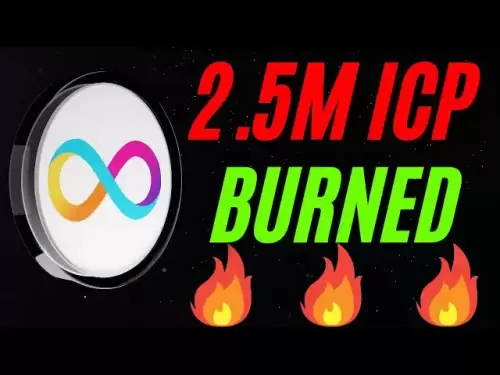 |
|
 |
|
 |
|
 |
|
 |
|
 |
|
 |
|
 |
|
 |
|
 |
|
 |
|
 |
|
 |
|
 |
|
 |
|
加密貨幣新聞文章
TRON Quietly Achieves 99.7% Block Production Efficiency, and Replaces 68% of Its Super Representatives Since 2020
2025/05/07 17:10

Recent data from CryptoQuant shows that the Tron Network has achieved a 99.7% block production efficiency. The data also shows that 68% of TRON Super Representatives have also been replaced since 2020. These updates mark a critical shift in network governance and performance.
These changes are crucial for better decentralization, stability, and system responsiveness.
Such operational consistency suggests Tron is quietly refining its infrastructure and validator framework. While it may avoid headlines, Tron steadily improves. This progress underscores the network’s commitment to long-term strength and reliability. It reflects deeper shifts toward efficiency and community-driven decisions.
What Is Being Said About TRON Today?
Validators in the TRON ecosystem are known as Super Representatives. They gain their roles through a Delegated Proof-of-Stake voting system. Any Tron account holder can apply by depositing 9,999 TRX. The top twenty-seven accounts with the most votes earn an election. These representatives run validator software and process network transactions. They also participate in governance decisions. The system allows broader community involvement through voting power. This selection method helps uphold transparency and accountability in the chain. It strengthens the security and trust of the network.
Economic Incentives for Passive Tron Participants
Beyond the main twenty-seven, the Tron Network includes SR partners ranked twenty-eighth through one hundred twenty-seventh. These partners do not produce blocks. However, they share in voting rewards. Their presence promotes wider network inclusivity. Users and organizations can support these partners through votes. SR partners earn incentives based on their vote share. This tiered model welcomes technical and passive participants. It fosters economic benefits without requiring full node operation. Voters receive proportional rewards after commissions are deducted.
Voting Rewards and Participation in the Tron Ecosystem
Voting in the Tron blockchain requires staking TRX tokens. Each staked TRX yields one TRON Power point. Votes refresh every six hours, and only the latest count per account matters. Unstaking TRX removes TRON Power and cancels active votes. This design encourages active participation over passive holding. It ensures that TRON Super Representatives elections reflect current community views. Reward calculations adjust with each six-hour cycle. This approach discourages stagnant control by a few holders. Tron stakeholders can easily change their votes to support different candidates. Real-time voting dynamics keep governance responsive and meaningful.
Tron block production and voting bring two reward types. When an SR produces a block, it earns sixteen TRX. An additional one hundred sixty TRX is reserved for voting rewards each cycle. These voting rewards are split among all SRs and SR partners proportional to the vote share. After SR commissions, voters receive their share. This structure motivates validators and community contributors. Consistent incentives strengthen network security and participation. Rewards drive long-term engagement in the Tron ecosystem.
TRON Super Representatives’ Role in Decentralized Governance
A brokerage ratio adds another governance layer to the Tron blockchain. SRs and SR partners charge a commission on rewards before sharing. The default brokerage rate stands at twenty percent. Voters can view and modify this rate through specific interfaces. This feature lets voters choose representatives based on performance and commission levels. Flexibility in brokerage fosters healthy competition and transparency. It makes the network more appealing to both technical contributors and everyday stakeholders. It ensures fair reward sharing across the community.
New Super Representative Signals Confidence in TRON
Recently, P2P.org became one of the TRON Super Representatives. P2P.org operates validation infrastructure across more than forty blockchains. Its election signals deeper institutional involvement in Tron block production. As an SR, it helps govern network security and process transactions. This move may simplify institutional access to Tron staking solutions. P2P.org’s expertise could boost network reliability and performance. Overall, these internal upgrades point to a more mature and adaptable ecosystem. It demonstrates Tron’s steady evolution amid fierce competition. Such developments help maintain user trust and network resilience.
免責聲明:info@kdj.com
所提供的資訊並非交易建議。 kDJ.com對任何基於本文提供的資訊進行的投資不承擔任何責任。加密貨幣波動性較大,建議您充分研究後謹慎投資!
如果您認為本網站使用的內容侵犯了您的版權,請立即聯絡我們(info@kdj.com),我們將及時刪除。
-

-

- Ruvi AI(RVU)利用區塊鍊和人工智能破壞營銷,娛樂和金融
- 2025-06-13 07:05:12
- 長期以來,Tron一直是區塊鏈項目如何通過關注其使命並實現一致增長來取得顯著成功的一個輝煌的例子。
-

-

-

- 隨著RWA集成計劃,信任錢包令牌(TWT)的價格下跌了5.7%
- 2025-06-13 06:45:13
- Trust Crypto Wallet的最新宣布將令牌化現實資產(RWAS)帶到其超過2億用戶引起了興奮。
-

- 以太坊(ETH)處於三階段市場週期的第二階段
- 2025-06-13 07:25:13
- 根據分析師Abbé提供的圖表和推文信息,以太坊(ETH)處於三階段市場週期的第二階段。
-

-

-




















![“ ColorBlind”作者:Robzombie_level完成100%(1個硬幣)[硬級]。 “ ColorBlind”作者:Robzombie_level完成100%(1個硬幣)[硬級]。](/uploads/2025/06/17/cryptocurrencies-news/videos/colorblindrobzombielevel-complete-coin-hard-level/6850630484c02_image_500_375.webp)







































